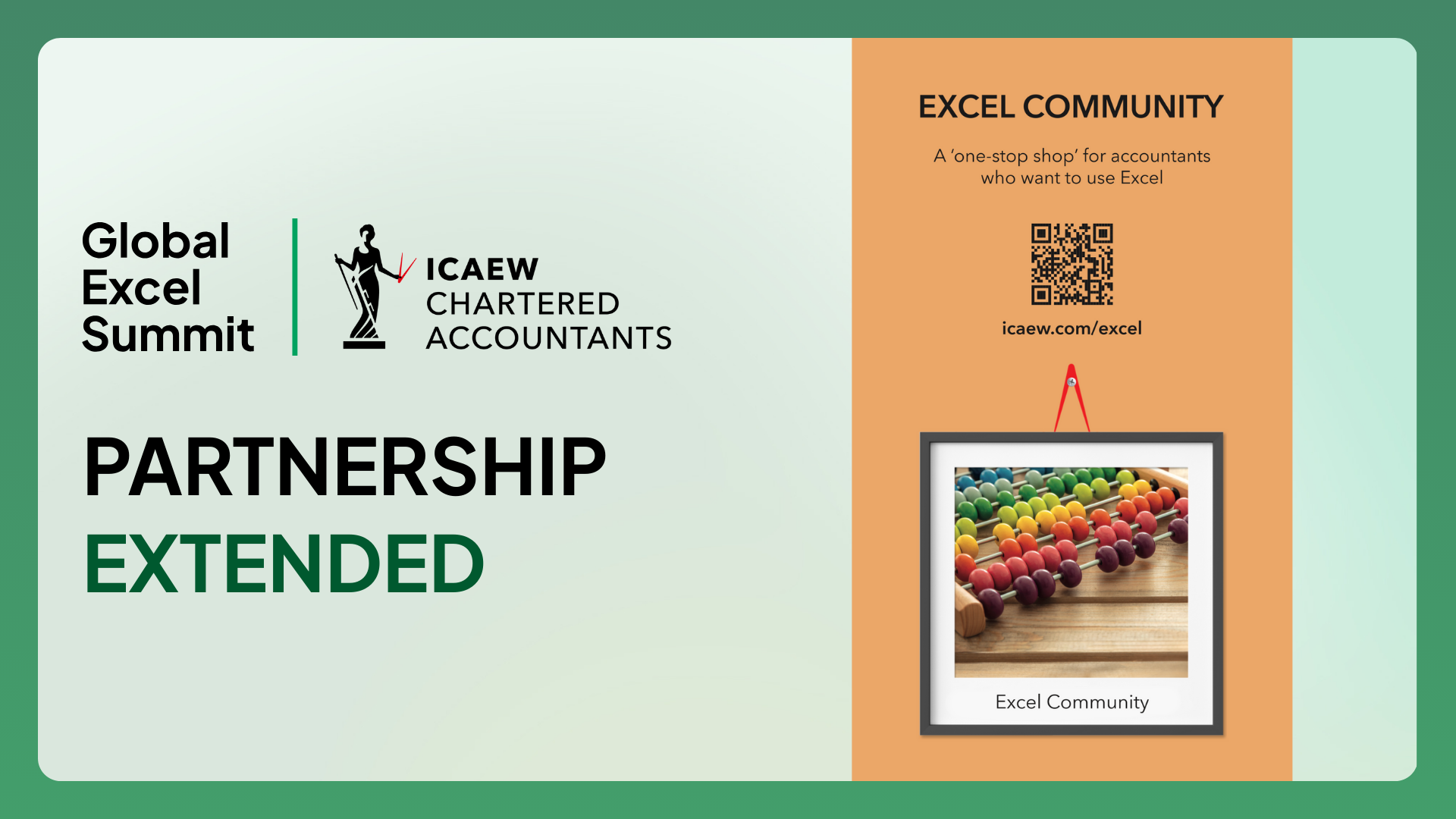.png)
The opening day at Global Excel Summit 2023 featured a panel of experts discussing the role of Excel in education—everything from their own experiences growing up, to strategies for bringing Excel knowledge to technologically challenged parts of the world. It was a lot to cover in the space of an hour, but the group managed to generate a steady stream of ideas and inspiration.
(To view a recording of the session, plus many others from the event, visit globalexcelsummit.com/access.)
Cheri Bortleson joined the Excel team as program manager after 22 years in the American K-12 public education system, with the goal of developing and expanding data literacy, AI, and STEM in education. Programs like Microsoft’s “Hacking STEM” are built around real-world, hands-on problem-solving projects for kids, starting in elementary school. Given the dizzying pace of technology, Bortleson sees her job as a critical mission. “We really want to empower students and prepare them to be future-ready,” she said.
Bortleson was joined on the panel by Microsoft colleague Steve Kraynak, who has worked as product manager for the Excel team since 2011. His job includes making Excel’s educational materials as straightforward and accessible as possible. “We’re trying to put out lesson plans that teachers can just pick up and use,” he said. “We try to make things as simple as possible so that it’s not a blocker for someone who may not be so confident in Excel.” As a father of four, he has witnessed firsthand the gaps in the education system when it comes to Excel, even for kids with him as their dad. “I wish my kids knew more about Excel, honestly.”
Chris Dutton, the renowned data analytics instructor with Maven Analytics, works mostly with adult professionals. But he also sees the shortcoming in education. “Excel was sorely lacking in my own education experience—in fact, no one taught me Excel formally through high school or my college experience. So I think there’s a huge, huge gap there.”
Where there’s a gap, there’s also an opportunity, said Dutton. “Excel is really the best platform in the world for teaching core data literacy skills—helping people to learn how to speak the language of data.” It’s a skill we need now, more than ever, he suggested. “Even with the revolution of AI and machine learning, I don’t think that replaces the need for these skills that Excel is so good at teaching. The demand for Excel skills is only growing at this point.”
Jason Clarke is VP of Sales at Pleasant Solutions, the parent company of Sheetcast—but he’s also passionate about education. “I sit on a school board, and I have for many years,” he said. “At our school board, we talk a lot about critical thinking.”
One way of expanding kids’ education in that area, says Clarke, is by doing a better job of teaching Excel. “Learning how to learn, learning how to problem-solve, learning how to think critically—in ways that are scalable—these are things that Excel just inherently brings to the table.”
.png)
Sheetcast, the newest product from Clarke’s company, could play a role in making Excel more accessible and relevant to students. “Most kids aren’t interested in rows, columns, and financial analysis; they don’t even have money,” Clarke said. “But you can make it engaging by making the subject matter relevant to them. Sheetcast allows you to take that another step, where now you can start sharing, building, and innovating on your own—or in collaboration with your classmates.”
Session host Matthew Bernath wondered about the challenges of teaching data literacy to younger and younger children, especially in an era where attention spans have become TikTok-short. “What age do you start, and how do you get these concepts across?”
For Bortleson, the secret lies in the power of engagement. Microsoft’s education programs are rooted in exercises rooted in the student’s own lived experiences. “Students are collecting their own data, in real-time. They’re using a Raspberry Pi, they’re making their own model, they’re connecting multiple sensors, and then they plug it into Excel,” she said.
The excitement students experience while working on their small projects can be transformed into a better understanding of big data and its role in machine learning and AI, Bortleson said. “We have a really intentional progression. But it starts with the personal, local, and immediate.”
Clarke said a product like Sheetcast could help create that kind of spark, by enabling ordinary Excel users to build interactive web apps. “Now I can take any information on any subject that I’m interested in, and I can create and share online that application, those tools, that information. As soon as you go from self to community, you again expand the engagement and interest in the students involved.”
Better Excel literacy would also have spin-off benefits for teachers, Clarke suggested. “In the process of teaching Excel to their students, teachers will recognize ways they might incorporate it into their own work lives. That, in turn, will make them even more engaged in teaching those skills to their classes.”
Another key to engaging students, suggested Dutton, lies in allowing them to learn in their own ways, at their own pace. “I see a huge opportunity to adapt a hybrid learning model. When we talk about traditional academic education versus online, we tend to talk in extremes— ‘Is online learning going to replace the traditional university model?’ Realistically, I think there’s a lot of middle ground and there’s a lot of room to capitalize on the best of both worlds.”
Recently, Maven Analytics has been focusing some effort in this direction, said Dutton. “We’re working with educators to help them assess their students’ skills, we’re building personalized learning plans, and we’re introducing this hybrid model where we’re tying together asynchronous learning and the live classroom experience.
.png)
“Everyone learns in different ways. Everyone learns at their own pace. Everyone’s starting from a different point. Forcing everyone in a classroom through the same experience, on the same timeline, runs the risk of isolating students who may need a different type of learning experience.”
Next, Bernath steered the conversation towards the challenges of technological education in a world of massive inequality. “How do we drive Excel education, and STEM education in a world where many schools don’t have electricity and don’t have computers?”
While none of the panelists had any magical solutions, they had ideas for at least reducing the barriers.
“At Microsoft, we’re committed to making all of our curriculum free for educators,” Bartleson began. At the same time, she said, the programs are designed to keep costs down. “You use materials that you can either find in your home or at the local drug store—things that are very easy to acquire, and at low cost. Our Hacking STEM resources are used widely around the world for that reason.”
Kraynak pointed out that most of Microsoft’s education programs don’t have to be run on traditional PCs. “We recognize that not every school district has Windows laptops. We’re trying to overcome that hurdle by making all of our programs work through a web browser. So, you’ll be able to do it through Excel for the web, which is free, and can work on lower-cost devices like Chromebooks.”
Above all, Bortleson suggested, students everywhere can benefit from building their skills for what she calls “productive struggle.”
“What’s demanded in future work skills is that people can wrestle with problems—take a hard look at things and come up with multiple solutions or angles for a problem. I think, at least in the American school system, we’re not centered around that kind of experience.”
Clarke agreed. “I think of education much less in terms of content, and more in terms of providing opportunities for inspiration, opportunities to problem-solve and struggle. Providing opportunities to understand critical thinking, and how—in the case of data—it can change your perspective quickly. If I were to change my education in one way, it would be more focused on those moments of inspiration—personalizing the content and making it relevant to me as a student.”
.png)
As the session began to wrap up, Dutton reflected on Excel’s power to inspire him as an educator. “Excel is an incredibly sophisticated piece of software disguised as a simple spreadsheet,” he said. Once he understood Excel’s potential, he couldn’t wait to start spreading the word. “That insight, of realizing how powerful it could be—that’s what inspired me to start teaching Excel. I wanted to share that same lightbulb moment with every student I possibly could, around the world.”
Bortleson said she’s driven, at least in part, by a desire to help demolish the barriers that held her own education back. “My dad was a scientist, but I was given very clear messages very early on that math and science were not for me.
“The implicit bias I experienced as a child is one of the reasons I eventually went into STEM education, promoting STEM, and bringing engineering into the classroom starting in kindergarten.”
Experiences like GES 2023 give her hope for the future, Bortleson concluded. “That’s what’s so exciting to me with this global Excel community—to see the diversity and the women MVPs. I’m just so inspired because I didn’t see that when I was a kid.
“We have the opportunity to really move forward and be more inclusive. I think we’re moving in the right direction.”
Latest Articles
.png)
GES and MEWC Partner to Create Europe’s Premier Excel Week

ICAEW Confirms Continued Partnership with the Global Excel Summit
.png)
Global Excel Summit Returns to London in May 2026!
One week, two premier events
Join the European Excel Week - from learning and mastering new skills at Global Excel Summit to elite performance at the Excel Esports European Open.




.avif)